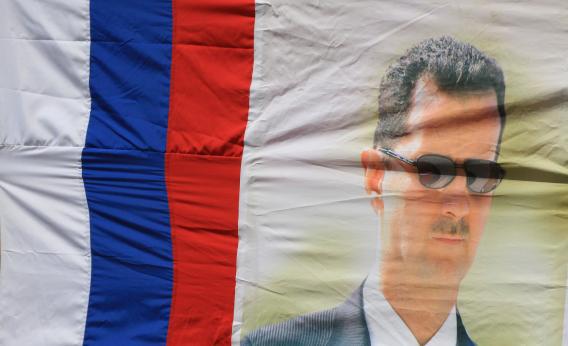With talk of intervention growing in Washington and other Western capitals, the Russian newspaper Izvestia has published a rare interview with Bashar al-Assad, in which the Syrian president seems to be looking to shore up his support from his most powerful international ally:
You may be wondering, like many Russians, why Russia continues to stand by Syria. It is important to explain this reason to the general public: Russia is not defending President Bashar al-Assad or the Syrian government, since the Syrian people should decide their president and the most suitable political system—this is not the issue. Russia is defending the fundamental principles it has embraced for more than a hundred years, the first of which is independence and the policy of non-interference in internal affairs. Russia itself has suffered and continues to suffer from such interference.
Assad also compares Syria’s current situation to Russia’s ongoing conflict with Islamist extremists in the North Caucasus, saying, “In Syria, we understand well what it means when extremists from Chechnya kill innocent civilians, what it means to hold under siege children and teachers in Beslan or hold innocent people hostage in Moscow’s theatre.”
He declines to comment on specific weapons systems that Russia may have provided to Syria, but says that “all contracts signed with Russia are being honored and neither the crisis nor the pressure from the US, European or Gulf countries’ have affected their implementation.” The caginess seems intentional: As of June, Vladimir Putin said that Russia had not yet fulfilled a contract to provide the Syrians with a sophisticated S-300 air defense missile system.
Last week Russian Foreign Minister Sergei Lavrov called on the Syrian government to cooperate with U.N. chemical weapons inspectors and “ensure the safe access of the mission to the scene of the alleged attack.” Assad’s government did agree to the inspection on Sunday, though the team apparently came under sniper fire on its way to the site today. Lavrov has continued to publicly go to bat for the Syrian government, warning the United States against intervention and “bypassing the United Nations.”
The Russian government has downplayed Syria’s strategic military importance and claims to have evacuated the small naval base it maintained in the town of Tartus. Assad seems to be looking to remind his Russian friends that their relationship is based not on narrow strategic calculations—Syria would seem to be an ally of diminishing returns these days—but on a universal principle of state sovereignty and nonintervention.
In the same interview, Assad accuses Israel of providing direct support for the rebels. “If these terrorist groups were indeed hostile to Israel and hysterical even on the mention of the word as you mention, why have they fought the Soviet Union, Syria and Egypt, whilst never carrying out a single strike against Israel?” he asks. He also calls antagonist Turkey “pitiful” and suggests it is “being manipulated by a meager amount of dollars through a Gulf state harboring a regressive mentality.”
Finally, just as he refers to Russia’s long-standing worries about foreign intervention, he also plays on U.S. fears of quagmire, warning that the United States does intervene, it will fail as it has “in every war since Vietnam.”
“America has waged many wars, but has never been able to achieve its political objectives from any of them,” he states. “Global powers can wage wars, but can they win them?”
If nothing else, the Syrian president seems to have a good sense of the public insecurities of global superpowers.
